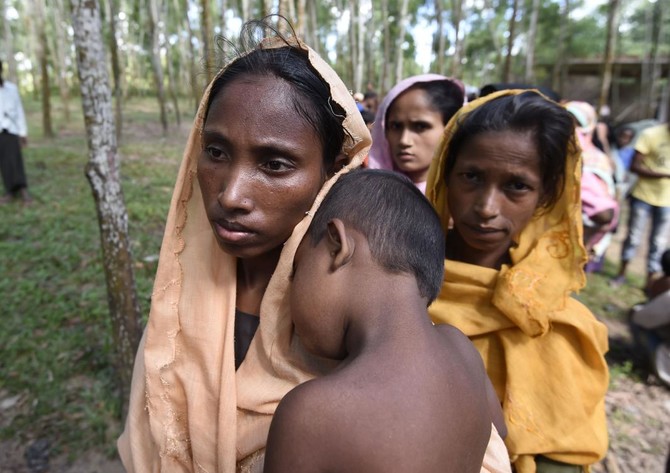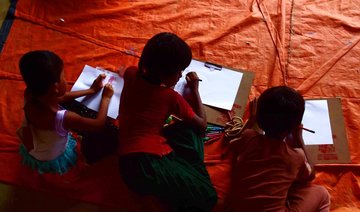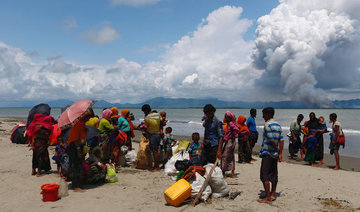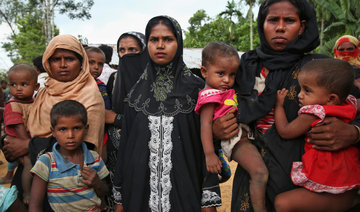COX’S BAZAR, Bangladesh: Bangladesh authorities on Friday deployed hundreds of police to protect Buddhist temples in the region where about 400,000 Muslim Rohinygas have sought refuge from unrest in Myanmar.
The move came amid fears of attacks on the religious minority in revenge for events in Buddhist-dominated Myanmar.
Thousands of supporters of a hard-line Islamist group staged protests in the border town of Cox’s Bazar after Friday prayers, calling on Myanmar to halt what they called the “genocide” of the Rohingya – who are in the minority in Myanmar.
Most of the Rohingya refugees have fled to camps around the Bangladesh border city where there were already 300,000 Rohingya before the latest unrest erupted on August 25.
There has been a huge outpouring of sympathy in Bangladesh for the persecuted Muslim group, with media giving blanket coverage to accounts of massacres and torture by the Myanmar army and Buddhist militia.
Cox’s Bazar police chief Iqbal Hossain said 550 police have been deployed in the region, including at 145 Buddhist temples, to prevent ethnic violence.
He said police had stepped up security so local Buddhists, who have been established for centuries, “don’t feel panicked”.
“It’s a preventive measure,” he told AFP. “We’ve also set up check-posts across the district.”
The reinforcements have come from the port city of Chittagong to watch temples, including the 300-year-old Kendriya Shima Bihar at Ramu, which hosts important Buddhist relics.
Police were also patrolling outside Buddhist temples in Ukhia and Teknaf – the nearby towns where most of the newly arrived 400,000 Rohingya refugees took refuge.
District authorities have also set up an inter-religious communal harmony committee since the Rohingya crisis started.
Jyotirmoy Barua, a top lawyer from the Buddhist community, told AFP that some 20 armed police were at a temple at Ramu in Cox’s Bazar on Friday.
Buddhist leaders in Bangladesh have protested the anti-Rohingya violence in Myanmar’s Rakhine state and have urged Myanmar to resolve the crisis.
They said there have been some minor incidents targeting the Buddhist community.
“They (Bangladeshi Buddhists) are feeling insecure. There is uneasiness,” Barua said.
Police in neighboring Chittagong district have also stepped up security at dozens of Buddhist temples, a senior police official told local media.
Buddhists make up less than one percent of Bangladesh’s 160 million people. They are well integrated in society but have faced past attacks.
In 2012, some 25,000 Muslims attacked Buddhist temples and businesses around Cox’s Bazar after a Buddhist allegedly put an image defaming the Qur'an on Facebook.
At least 11 Buddhist temples were torched in the riot. There were allegations in the local press that some Rohingya joined the attack.
Bangladesh guards Buddhist temples amid Rohingya backlash fears
Bangladesh guards Buddhist temples amid Rohingya backlash fears

More evacuation orders issued as firefighters battle major wildfire on the Greek island of Chios
The fire department said 190 firefighters were battling the blaze Monday. They were backed up by 35 vehicles, five helicopters and two water-dropping planes. Strong winds in the area since Sunday have hampered firefighting efforts.
Push alerts have been sent to mobile phones in the area urging people to evacuate a total of 16 villages, settlements and neighborhoods on the outskirts of Chios town since the blaze broke out on Sunday.
The fire started in three separate locations. Authorities have sent a specialist fire department arson investigation team to the island to look into the causes.
Wildfires are frequent in Greece during its hot, dry summers, but authorities have said climate change has been fueling bigger and more frequent blazes.
In 2018, a massive fire swept through the seaside town of Mati, east of Athens, trapping people in their homes and on roads as they tried to flee. More than 100 people died, including some who drowned trying to swim away from the flames.
Sri Lanka seizes $76m smuggled drugs this year

COLOMBO: Sri Lanka’s anti-narcotics drive has resulted in the seizure of more than three tonnnes (6,600 pounds) of illegal drugs with a street value of $76 million this year, officials said Monday.
Public Security Minister Ananda Wijepala said most of the illegal drugs originated in Afghanistan and Pakistan, and were being smuggled into the island by sea.
He said there were an estimated 400,000 addicts in the nation of 22 million people.
“We need to reduce demand while keeping up detections,” Wijepala told reporters in Colombo.
Police chief Priyantha Weerasooriya said the drugs seized had a street value of 23 billion rupees ($76 million). That was close to the 28 billion rupees’ worth of drugs seized in the whole of 2024.
More than 1,000 people were arrested for drug dealing and smuggling, he added. They included a 38-year-old Thai woman, arrested at Colombo airport on May 30 carrying nearly 10 kilograms (22 pounds) of cocaine, the largest detection of the drug at an entry point to the South Asian nation.
Also last month, three others — from Britain, India and Thailand — were arrested trying to smuggle in nearly 60 kilograms (132 pounds) of synthetic cannabis.
All four suspects, including the Thai woman arrested with cocaine, could face life imprisonment if convicted.
Sri Lankan authorities have previously seized large quantities of heroin off the country’s shores, suggesting the island is being used as a transit hub for narcotics destined for other locations.
In October, a Sri Lankan court sentenced 10 Iranian men to life imprisonment after they pleaded guilty to heroin smuggling.
Sri Lanka’s largest single seizure of narcotics occurred in December 2016, when Customs found 800 kilos of cocaine in a transshipment container of timber destined for India.
Okinawa marks 80 years since end of one of harshest WWII battles with pledge to share tragic history
Okinawa marks 80 years since end of one of harshest WWII battles with pledge to share tragic history

- The Battle of Okinawa killed a quarter of the island’s population, leading to a 27-year US occupation and a heavy American troop presence to date
TOKYO: Okinawa marked the 80th anniversary of the end of one of the harshest battles of World War II fought on the southern island.
With global tensions escalating, its governor said on Monday it is the Okinawan “mission” to keep telling the tragic history and its impact today.
The Battle of Okinawa killed a quarter of the island’s population, leading to a 27-year US occupation and a heavy American troop presence to date.
Monday’s memorial comes one day after US attacks on Iranian nuclear facilities, adding to a sense of uncertainty on the island about the heavy American military presence and in its remote islands, already worried about getting embroiled in a potential conflict in Taiwan.
Gov. Denny Tamaki, noting the escalating global conflicts and nuclear threats, made a resolve to contribute to global peace studies, disarmament and the preservation of war remains. “It is our mission, as those living in the present, to preserve and pass on the reality and lessons to future generations.”
Fierce battle and civilian deaths
US troops landed on the main Okinawa island on April 1, 1945, beginning a battle in their push toward mainland Japan.
The Battle of Okinawa lasted nearly three months, killing some 200,000 people — about 12,000 Americans and more than 188,000 Japanese, half of them Okinawan civilians including students and victims forced into mass suicides by Japan’s military.
Okinawa was sacrificed by Japan’s Imperial Army to defend the mainland, historians say. The island group remained under US occupation until its reversion in 1972, two decades longer than most of Japan.
Monday’s memorial was held at the Mabuni Hill in Itoman City, where the remains of most of the war dead reside.
Remembering the tragedy
Prime Minister Shigeru Ishiba was in a hot seat when he attended Monday’s ceremony. Weeks earlier, one of his ruling party lawmakers Shoji Nishida, known for whitewashing Japan’s wartime atrocities, denounced an inscription on a famous cenotaph dedicated to students as “rewriting history” by portraying the Japanese army as having caused their deaths, while Americans liberated Okinawa. Nishida also called Okinawa’s history education “a mess.”
His remark triggered an uproar in Okinawa, forcing Ishiba days later to apologize to the island’s governor, who had criticized the remark as outrageous and distorting history.
The Himeyuri Cenotaph commemorates student nurses who were abandoned near the end of the battle and killed, some in group suicides with teachers. Japan’s wartime military told the people never to surrender to the enemy, or die.
Nishida’s remarks add to concerns about the whitewashing of Japan’s embarrassing wartime past as memories of the tragedy fade and ignorance about the suffering grows.
Ishiba, at Monday’s memorial, said Japan’s peace and prosperity is built on the sacrifices of Okinawa’s history of hardship and that it is the government’s responsibility to “devote ourselves to achieve a peaceful and prosperous Okinawa.”
Postwar years and growing fear
Okinawa remained under US occupation from 1945 until the 1972 reversion to Japan. The US military maintains a heavy presence there due to Okinawa’s strategic importance for security in the Pacific. Their presence serves not only to help defend Japan but also for missions elsewhere, including in the South China Sea and the Middle East.
Private properties were confiscated to build US bases, and the base-dependent economy has hampered the growth of local industry.
Fear of a Taiwan conflict rekindles bitter memories of the Battle of Okinawa. Historians and many residents say Okinawa was used as a pawn to save mainland Japan.
There are also ancient tensions between Okinawa and the Japanese mainland, which annexed the islands, formerly the independent kingdom of the Ryukus, in 1879.
Burden of history
Okinawa remains home to the majority of about 50,000 US troops stationed in Japan under a bilateral security pact. The island, which accounts for only 0.6 percent of Japanese land, hosts 70 percent of US military facilities.
Even 53 years after its reversion to Japan, Okinawa is burdened with the heavy US presence and faces noise, pollution, aircraft accidents and crime related to American troops, the governor said.
Nearly 2,000 tons of unexploded US bombs remain in Okinawa, with some regularly dug up. A recent explosion at a storage site at a US military base caused minor injuries to four Japanese soldiers.
Remains of hundreds of war dead are still unrecovered on Okinawa, as the government’s search and identification effort is slow to make progress.
Pakistan condemns Trump for bombing Iran a day after recommending him for a Nobel Peace Prize

- Pakistan condemned the US for attacking Iran, saying the strikes “constituted a serious violation of international law” and the statute of the International Atomic Energy Agency
ISLAMABAD: Pakistan condemned US President Donald Trump for bombing Iran, less than 24 hours after saying he deserved a Nobel Peace Prize for defusing a recent crisis with India.
Relations between the two South Asian countries plummeted after a massacre of tourists in Indian-controlled Kashmir in April. The nuclear-armed rivals stepped closer to war in the weeks that followed, attacking each other until intense diplomatic efforts, led by the US, resulted in a truce for which Trump took credit.
It was this “decisive diplomatic intervention and pivotal leadership” that Pakistan praised in an effusive message Saturday night on the X platform when it announced its formal recommendation for him to receive the Nobel Peace Prize.
Less than 24 hours later, however, it condemned the US for attacking Iran, saying the strikes “constituted a serious violation of international law” and the statute of the International Atomic Energy Agency.
Pakistani Prime Minister Shehbaz Sharif, in a phone call Sunday with Iranian President Masoud Pezeshkian, expressed his concern that the bombings had targeted facilities that were under the safeguards of the IAEA. Pakistan has close ties with Iran and supports its attacks on Israel, saying it has the right to self-defense.
There was no immediate comment on Monday from Islamabad about the Trump Nobel recommendation, which also followed a high-profile White House lunch meeting between the president and Pakistan’s powerful army chief, Asim Munir.
Thursday’s meeting, which lasted more than two hours, was also attended by the Secretary of State Marco Rubio and Steve Witkoff, the US Special Representative for Middle Eastern Affairs.
According to a Pakistani military statement, a detailed exchange of views took place on the “prevailing tensions between Iran and Israel, with both leaders emphasizing the importance of the resolution of the conflict.”
While Pakistan was quick to thank Trump for his intervention in its crisis with India, New Delhi played it down and said there was no need for external mediation on the Kashmir issue.
The Himalayan region of Kashmir is divided between Pakistan and India but claimed by both in its entirety. India accuses Pakistan of backing militant groups in the region, which Pakistan denies.
Thailand heads into political turbulence as Cambodia row festers

- Thai Prime Minister Thaksin Shinawatra, has come under fire after a phone call between her and former Cambodian leader Hun Sen to diffuse a long-festering border dispute became public last Wednesday
BANGKOK: Thailand’s government said on Monday it would push ahead with a cabinet reshuffle this week, facing down a backlash against its handling of a border row with Cambodia that has left Prime Minister Paetongtarn Shinawatra hanging on to power by a thread.
Tensions with Thailand and Cambodia remain elevated, with the Southeast Asian neighbors announcing tit-for-tat measures that are stoking nationalist fervor on both sides and stymieing bilateral trade, including a suspension by Phnom Penh of all Thai fuel and gas imports that came into effect on Monday.
In Bangkok, days after the parliamentary majority of the ruling coalition led by Paetongtarn’s Pheu Thai party was threatened by the exit of a major alliance member, Deputy Prime Minister Phumtham Wechayachai sought to project unity.
“I’m 100 percent confident that we will move ahead strongly after the cabinet reshuffle is completed this week,” he told reporters.
“You will see a new way of working that’s different from before.”
Paetongtarn, a 38-year-old political novice and daughter of divisive former Prime Minister Thaksin Shinawatra, has come under fire after a phone call between her and former Cambodian leader Hun Sen to diffuse a long-festering border dispute became public last Wednesday.
In the audio, which was released in full by Hun Sen after the initial leak of a clip, the Thai premier appears to grovel before the Cambodian politician and also denigrates a senior Thai military commander in charge of the disputed border area.
Hours after the audio became public, the second-largest coalition member, the Bhumjaithai Party, quit the government, putting its parliamentary majority and Paetongtarn’s premiership under threat.
Pheu Thai has managed to hold the remainder of its coalition together, with the cabinet reshuffle meant to redistribute ministerial positions previously held by Bhumjaithai.
The coalition’s stability will be tested in parliament, which reconvenes next week, and on the streets as anti-government groups plan a major protest to call for the prime minister’s resignation which will start on Saturday.
Adding to the pressure, Paetongtarn also faces scrutiny from the judiciary after a group of senators seeking her removal petitioned the Constitutional Court and an anti-graft body to investigate her conduct over the leaked phone call.
“The government cannot take anything for granted,” said Titipol Phakdeewanich, a political science professor at Ubon Ratchathani University.
“There’s more instability ahead.”
TRADE UNDER THREAT
At the root of the current crisis for Paetongtarn and Pheu Thai is a historic border dispute with Cambodia, which has previously led to violent clashes, including the death of a Cambodian soldier during a skirmish last month.
Partly banking on strong ties between the Shinawatra family and Hun Sen, the government initially pushed for a diplomatic solution to the flare-up, even as Cambodia moved to petition the International Court of Justice to resolve the matter.
However, the unexpected release of the audio not only brought the Thai government to the brink, it has also led to a further deterioration in relations between the neighbors.
Hun Manet, Cambodia’s prime minister and Hun Sen’s son, said on Sunday that his administration would stop all fuel and gas imports from Thailand, following an earlier move to stall the entry of some Thai agricultural produce.
“Fuel supply companies in Cambodia are able to import sufficiently from other sources to meet domestic fuel and gas demands,” he said in a post on Facebook.
For its part, the Thai government has handed over control of border crossings along the Cambodian frontier to its military, which has tightened entry restrictions and shut down one crossing point, citing security concerns.
Cambodia was Thailand’s 11th largest export market last year, with $10.4 billion in bilateral trade between the neighbors, dominated by precious stones, jewelry and fuels, according to Thai government data.
And more than half a million Cambodian workers are employed in Thailand, according to the Thai Labour Ministry.
“The Cambodia situation is complex; it isn’t about just a conflict between the two countries,” said Titipol, “There is also a Hun-Shinawatra dimension that could still shake the government.”




















